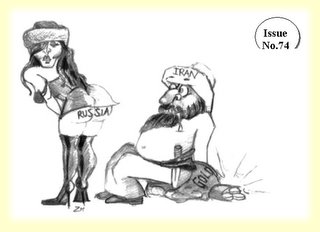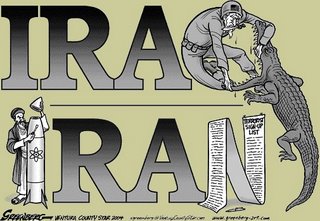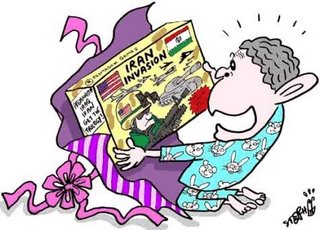Sunday, April 30, 2006
No Sweats for Berkeley; UC Students Protest - Naked!
naked protest_0001
Video sent by omemarian
Thursday, April 27, 2006
Who Rules Iran??
 A famous Iranian cartoonist, Nikahang Kosar, drew this popular cartoon mocking Iran's confused forieng policy. You hear something surprising coming out of Iran every day: first, that Iran's supreme leader is offering nuclear know-how to Sudan! Then that Iran is ready for a nuclear deal; then that Iran is vowing to attack US interests all over the world if provoked; then that Iran rules out using oil as weapon.
A famous Iranian cartoonist, Nikahang Kosar, drew this popular cartoon mocking Iran's confused forieng policy. You hear something surprising coming out of Iran every day: first, that Iran's supreme leader is offering nuclear know-how to Sudan! Then that Iran is ready for a nuclear deal; then that Iran is vowing to attack US interests all over the world if provoked; then that Iran rules out using oil as weapon. In 2003 Iran decided to voluntarily suspend uranium enrichment. In 2005 it decided to defy the world by breaking agreements and corssing red lines. Iran's foreign policy just seems to be moving back and forth, from one extreme to another.
Who rules Iran? Why such contradictory foreign policy?
The answer is to be found in the Islamic Republic's unique institutional configuration. Unlike most other Middle Eastern regimes (which are personalistic autocracies) the Islamic Republic is an institutionalized theocracy. The mullahs learned the shah's lesson: they created a vast network of intertwined and overlapping institutions. There are numerous institutions in charge of foreign policy, for instance: the office of the supreme leader, the foreign ministry, the national security council, the expediency council, and so on.
An offshoot of this over-institutionalization has been the escalation of factional politics in Iran. While he was in power, Khomeini often maintained the balance of power among various revolutionary factions by putting them in charge of different institutions, many of which had overlapping functions. So you often get contradictory statements from two similar-ranking officials on any topic: one organization says that the rate of youth unemployment is 25%, another puts it at 33%, another at 14%! One organization says the rate of inflation is 12%, another that it is 15%, another 40%! And they are all official statistics!
You are, in essence, dealing with multiple centers of power in Iran. What measures you take, as the international community, is going to determine the ultimate outcome of the power war inside the country. There is no one overarching figure, no one leader, no one policy-maker ruling Iran; there are various factions with ties to various segments of society. The Ahmadinejad faction has the support of religious zealots and security apparatus; traditional conservatives have a base among Iran's baazari community; and pragmatists and reformers are backed by the middle class. Neither faction is strong enough to completely overpower the others. Where Iran will be headed in the next 20-30 years will be determined by what measures the US will take against it.
Sanctions would weaken the middle class, and hence the pragmatists. Military action would empower Ahmadinejad and the fundamentalists (and the security apparatus) - and so would surgical strikes.
Negotiating with Iran, on the other hand, would weaken Ahmadinejad's faction and empower the pragmatists, who have called for reestablishing ties with the US time and again (read an excellent article on this issue from Mother Jones by clicking on the link).
The outcome of factional politics in Iran is determined in large part by the international community's reaction to Iran's nuclear program. What will it be?
- Assareh
Wednesday, April 26, 2006
From Everything To Nothing
 Most of you have heard of the former oil giant, Enron. Kenneth Lay the former chairman of Enron Corporation testified in court today and called government charges against him "cockamamie”. Here is Kenneth Lay’s past and present by the numbers:
Most of you have heard of the former oil giant, Enron. Kenneth Lay the former chairman of Enron Corporation testified in court today and called government charges against him "cockamamie”. Here is Kenneth Lay’s past and present by the numbers:-- Net worth, 2000: $350 million.
-- Net worth, 2001: $50 million.
-- Net worth, today: "More or less zero," Lay said. When pressed, he said it was around $250,000.
-- Total personal debt, at its height: $100 million.
-- Total compensation, 1999-2001: $223 million.
-- How much of that went to living expenses: $23 million.
-- How much given to charity: $25 million.
-- Amount of bonus received for becoming chief executive in August 2001: $10 million.
-- Number of houses: At least seven, including one in Houston, three in Aspen, Colo., three in Galveston, Tex.. The six houses outside of Houston were sold to pay legal bills. The houses in Aspen were sold for $20 million.
-- Total amount he borrowed from Enron in 2001 via special line of credit for executives: $77.5 million.
-- Total repaid to Enron in 2001 via Enron stock: $70 million.
Kenneth Lay’s wealth – once over 350 million dollars- is now reduced to less than 250,000. This should be a good lesson for those executives who love to squeeze the numbers and think that their connections to some officials can buy them immunity from justice.
-Aramesh
Source: The Washington Post
Anderson Cooper on Bin Laden?
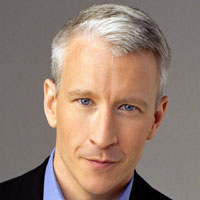
"Is Bin Laden Still Relevent" is the name of a
short piece I found on Andersoon Cooper's
personal blog. He is one of my favorite CNN
anchors, so check it out, its short and to the
point.
-Assareh
Tuesday, April 25, 2006
Naked Protests in Berkeley
 A couple of weeks ago we had two "Sweatfree Naked Protests" here on campus. The students demanded that the University adopt a "Designated Suppliers Program," and not buy UC apparel from sweatshops around the world. On the second day of the protest students organized a sit in at California Hall, where the chancellor's office is located. Because they were making too much noise, 18 of them were arrested briefly. I didn't see too many people participating when I was passing by. There was a crowd of probably 20 to 30 people protesting and another crowd 0f 40-50 watching.
A couple of weeks ago we had two "Sweatfree Naked Protests" here on campus. The students demanded that the University adopt a "Designated Suppliers Program," and not buy UC apparel from sweatshops around the world. On the second day of the protest students organized a sit in at California Hall, where the chancellor's office is located. Because they were making too much noise, 18 of them were arrested briefly. I didn't see too many people participating when I was passing by. There was a crowd of probably 20 to 30 people protesting and another crowd 0f 40-50 watching.You can read more about this and look at some other pictures by going either to Berkeley Experience blog which runs by a Berkeley Student and a friend of us, Nathan... or to California Patriot Blog which is a amazing blog. Here are the links to some videos gathered by Nathan of the berkeleyexperience blog:
I think that if the designated supplier program is adopted and each shirt becomes $30 instead of $10 then the first people that strat protesting would be the very same people! The economic imperatives and complexities surrounding the case are too many to be simply dismissed on the grounds that certain workers are not being treated as nicely as they should be in an ideal world.
- Assareh
Consequences of U.S. Attack on Iran

 Omid- Berkeley Forum has asked Professor George Bisharat about the escalating tensions between Iran & the United States. Professor Bisharat is a prominent legal scholar at the University of California's Hastings College of Law. He focuses on criminal law and Middle Eastern political & legal affairs. He believes that “a nuclear attack on Iran would be immoral, illegal, and politically disastrous.”
Omid- Berkeley Forum has asked Professor George Bisharat about the escalating tensions between Iran & the United States. Professor Bisharat is a prominent legal scholar at the University of California's Hastings College of Law. He focuses on criminal law and Middle Eastern political & legal affairs. He believes that “a nuclear attack on Iran would be immoral, illegal, and politically disastrous.”Do you think that the latest speculations on a possible nuclear attack on Iran are logical? What would be the reaction of the internaional community to such an attack?
In my view, a nuclear attack on Iran would be immoral, illegal, and politically disastrous. Of course, the same could be said of the invasion of Iraq, and that did not stop the Bush administration in 2003. However, I think that many elements in the Bush administration, including within the military, are against military action of any kind, not to mention the use of nuclear weapons. It is difficult to distinguish between genuine preparations for attack, and posturing for the purpose of intimidating Iran into concessions. But on balance, I think the odds are against a military strike against Iran.
Would attacking Iran raise the sympathy of the Muslim world? What about Islamist groups like Hamas in Palestine, Hezbollah in Lebanon, and Badr in Iraq?
If such an attack were to occur, I think it would inflame the entire Middle East and Muslim world, at least at the popular level. In fact, fear of this reaction is one of the factors restraining the Bush administration from attacking. How this reaction would be expressed by particular parties and governments is a little harder to predict, because any overt support for Iran would likely be met with consequences from the United States, and no group wants to be identified for this kind of treatment. So support would more likely be surreptitious.
Is there a possibility that in case of an attack Iran would retaliate by activating its Islamic allies in the region?
I would not expect Islamic allies in the Middle East to retaliate against the US militarily, and perhaps not at all on the official level. Again, the US has a great deal of economic, military, and diplomatic power that it can wield against any opponents of its policies, and so the latter have to resort to indirect means that do not put them in line for US retaliation.
*Professor Bisharat graduated cum laude from Harvard Law School in 1983 and holds a B.A. in anthropology (UC Berkeley, 1975), an M.A. in history (Georgetown University, 1979), and a Ph.D. in anthropology and Middle East studies (Harvard University, 1987).
Sunday, April 23, 2006
American Theocracy
 Here is a great book by a former Republican strategist Kevin Phillips called " American Theocracy". I finished reading it last week. I happen to share the same view with Mr. Philips on the negative role of religion in government. Many rational conservatives are also worried about the rise of the evangelical right. My main source of disagreement with the GOP has been their use of religion in order to win more votes. The GOP ( God's Own Party!!) as Pat Robertson described it once has become “the party of God”. The Party of God? Isn’t that the exact translation of the word “Hezbollah”? I am not suggesting that Hezbollah and the Republican Party are both terrorist organizations and I am certainly not making any comparisons between the two! I simply wanted to remind you all that “the party of God” in Arabic means “Hezbollah”!
Here is a great book by a former Republican strategist Kevin Phillips called " American Theocracy". I finished reading it last week. I happen to share the same view with Mr. Philips on the negative role of religion in government. Many rational conservatives are also worried about the rise of the evangelical right. My main source of disagreement with the GOP has been their use of religion in order to win more votes. The GOP ( God's Own Party!!) as Pat Robertson described it once has become “the party of God”. The Party of God? Isn’t that the exact translation of the word “Hezbollah”? I am not suggesting that Hezbollah and the Republican Party are both terrorist organizations and I am certainly not making any comparisons between the two! I simply wanted to remind you all that “the party of God” in Arabic means “Hezbollah”!-Aramesh
Friday, April 21, 2006
UC Berkeley Student Government Elections
UC Election-april20-2006-Small
Video sent by omemarian
Every year, there are elections for various offices such as positions in the Student Senate, Student Advocate's Office, Attorney General, etc. The Berkeley campus becomes alive more than ever, with people hanging out on Sproul and advertising themselves or their friends for office!
Wednesday, April 19, 2006
Mock War Game Shows Limited U.S. Options on Iran
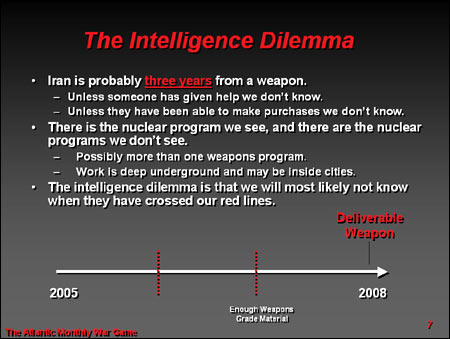 "The Atlantic Monthly magazine recently arranged a mock war game to examine U.S. options if military force is used to prevent Iran from becoming a nuclear power. As NPR's Michele Kelemen reports, the exercise showed how limited the options are.
"The Atlantic Monthly magazine recently arranged a mock war game to examine U.S. options if military force is used to prevent Iran from becoming a nuclear power. As NPR's Michele Kelemen reports, the exercise showed how limited the options are.Retired Air Force Col. Sam Gardiner ran the simulation. Armed with maps and charts in a slideshow, he laid out several options: one night of air strikes against Revolutionary Guard units to punish Iran if it meddles in Iraq; several days of air strikes aimed at Iran's nuclear program; or an all-out war to topple Tehran's clerical regime.
Listen to NPR Report on this topic....(Omid)
Tuesday, April 18, 2006
Why is Russia on Iran's side?
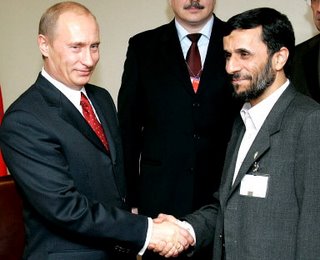 Russia opposes Iran nuclear sanctions as six party talks begin in Moscow on how to deal with Iran's nuclear programme.
Russia opposes Iran nuclear sanctions as six party talks begin in Moscow on how to deal with Iran's nuclear programme.Here are excerps from an excellent article on Russian-Iranian relations. You can read the full article here.
What's the importance of Iran for Russia?
Of all the states in the Middle East, perhaps none is more important to Russia than Iran. Iran's strategic location on the Persian Gulf, its importance as a trading partner, and its ties and interests in the former Soviet republics in Central Asia and Transcaucasia have all drawn Moscow's close attention.
Russia values Iran as an important market for Russian arms and nuclear reactors, and as a way to demonstrate independence from the United States. Russia is the largest contractor when it comes to building nuclear reactors in Iran. Just recently Iran concluded a $1B deal to buy missiles and arms from Russia.
The two countries also share an interest in checking Turkey's influence in Central Asia and Transcaucasia, in opposing Taliban forces in Afghanistan, and in containing Azerbaijani irredentism and independence. In addition, Iran needs Russia's diplomatic aid in the face of U.S. isolation.
The Impact of Russia's Domestic Politics

The impact of domestic politics on Russia's policy toward the Middle East was clearly illustrated by the shift from an initially strong pro-Western tilt in 1992 to a highly nationalist thrust by the end of 1999. In part, this was a reactive change to challenges from the Russian Parliament, where three main groups of legislator vied for power.
One group supported Yeltsin's pro-Western foreign policy, which included good ties with Israel, sanctions against Iraq, and cooperative relations with the countries in the "near abroad"-the former Soviet republics where 25 million Russian still live-along with his efforts to reform and privatize the Russian economy.
A second group advocated a "Eurasian" emphasis in foreign policy, which would not focus exclusively on the United States and Western Europe, but rather on good ties with the Middle East (including both Israel and Iran), China, as well as other areas of the world. This group also promoted closer ties with the "near abroad." On domestic policy, the Eurasianists, while still in favor of reform, advocated a far slower process of privatization.
The third group comprised a combination of old-line Communists and ultra-nationalists. Though differing on economic policy, the two groups wanted a powerful, highly centralized Russia. They wanted this state to act like a major world power and adopt a confrontational approach toward
 the United States, which they saw as Russia's main enemy, as well as toward Israel. In this context, they proposed renewing close ties with Moscow's former Middle East allies such as Iraq, and reinforce ties with Iran. Finally, this third group also advocated re-establishing Moscow's dominance over the "near abroad." Yeltsin's had to fight a steady movement toward a more nationalist and anti-American position in the Duma until his resignation as president on January 1, 2000.
the United States, which they saw as Russia's main enemy, as well as toward Israel. In this context, they proposed renewing close ties with Moscow's former Middle East allies such as Iraq, and reinforce ties with Iran. Finally, this third group also advocated re-establishing Moscow's dominance over the "near abroad." Yeltsin's had to fight a steady movement toward a more nationalist and anti-American position in the Duma until his resignation as president on January 1, 2000.History of Contemporary Russian-Iranian Relations

The Russian-Iranian rapprochement began in the latter part of the Gorbachev era. After alternatively supporting first Iran and then Iraq during the Iran-Iraq War, Gorbachev had clearly tilted toward Iran by July 1987. The two states solidified their ties in June 1989 when Iran's president, Hashemi Rafsanjani, visited Moscow and concluded a number of major agreements, including one on military cooperation. The military agreement permitted Iran to purchase highly sophisticated military aircraft from Moscow, including MIG-29s and SU-24s. At the time, Iran desperately needed Soviet military equipment as its air fleet had been badly eroded by the eight-year war with Iraq and it could not request spare parts, let alone new planes, from the United States.
Iran's military dependence on Moscow grew as a result of the 1990-1991 Gulf War. The United States, Iran's main enemy, become the primary military power in the Gulf, obtaining defensive agreements with several Gulf states that included pre-positioning arrangements for U.S. military equipment. Saudi Arabia, Iran's most important Islamic challenger, also acquired massive amounts of U.S. weaponry. In addition, while the war left Iraq badly damaged, its oil wealth could provide a quick military recovery if sanctions were lifted.
The war in Afghanistan, to Iran's northeast, continued despite the Soviet withdrawal, with Shi'a forces backed by Iran taking heavy losses. To the north, the USSR's collapse presented both opportunity and danger for Iran. On one hand, for example, Iran had the chance to export its influence to six new Muslim states (Azerbaijan, Uzbekistan, Kyrgyzstan, Tajikistan, Turkmenistan, and Kazakhstan). But Iran was also challenged by some factors. In Azerbaijan, the Popular Front, which ruled in 1992-1993, urged the unification of that country with Iran's Azerbaijan area. Iran faces a similar, if far less serious problem, with Turkmenistan, whose natural gas resources might make it an irredentist attraction for Turkmens living in northeastern Iran.)
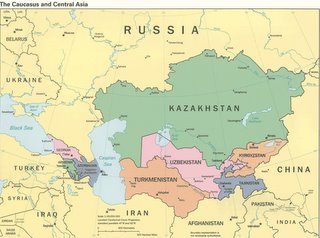
Given Iran's need for sophisticated arms, Rafsanjani was careful not to alienate either the Soviet Union or Russia during his term as president. Thus, when Azerbaijan declared its independence from the Soviet Union in November 1991, Iran--unlike Turkey--did not recognize its independence until after the USSR collapsed. Similarly, despite occasional rhetoric from Iranian officials, Rafsanjani ensured that Iran kept a relatively low Islamic profile in Azerbaijan and Central Asia, emphasizing cultural and economic ties rather than Islam as the centerpiece of relations. This was due in part to the fact that after more than 70 years of Soviet rule, Islam was weak in those places; leaders of the new states were all secular, and chances for an Iranian-style Islamic revolution were very low. Indeed, some skeptics argued that Iran was simply waiting for mosques to be built and Islam to mature before trying to bring about Islamic revolutions.
Nonetheless, the Russian leadership believed that Iran was basically acting very responsibly in Central Asia and Transcaucasia and was thus ready to continue supplying Tehran with modern weaponry-including submarines-despite strong protests from the United States. Iran's low-key reaction toward the first Muslim insurgency in Chechnya (1994-1996) and toward Russia's pro-Serb and anti-Muslim policy in Bosnia in 1993-1995 helped cement relations further.
During 1992, Yeltsin's honeymoon year with the United States--when he and Washington agreed on virtually all Middle East issues aside from Iran--the two countries clashed over Russian arms shipments to Iran. Iraq and Libya were under UN sanctions, while Syria lacked the hard currency to pay for weapons and already owed Russia some $10 billion. In contrast, Iran could supply Russia with badly needed hard currency.

In addition, despite Yeltsin's cultivation of the United States, there were a number of influential Moscow figures such as Yevgeny Primakov, then chief of one of Russia's intelligence branches, advocating a more independent Russian policy in the Middle East. Given that the United States did not have relations with Iran or Iraq, Russia could fill the diplomatic vacuum in both states. Furthermore, unlike Iraq or Libya, America's allies in the North Atlantic Treaty Organization (NATO) maintained extensive economic ties with Iran, though the Salmon Rushdie affair and the murder of Iranian exiles in Western Europe somewhat damaged political relations.
Thus, Russia had a certain amount of diplomatic cover for its dealings with Iran. Consequently, as Yeltsin came under fire from increasingly vocal members of parliament in 1993 and 1994 for being too subservient to the United States, he could point to American criticism of his policy toward Iran-which by 1993 included a promise to sell nuclear reactors-to demonstrate his independence. Indeed, one of the central issues of contention in the May 1995 Moscow summit between Clinton and Yeltsin was Russia's January 1995 decision to sell nuclear reactors that Washington claimed would speed Iran's acquisition of nuclear weapons. Yeltsin refused to back down in the face of U.S. pressures. But he did agree to cancel a proposed gas centrifuge sale to Iran--initially approved by Russia's atomic energy ministry--which might have aided Iran's nuclear proliferation, something very few Russians, including Yeltsin, wanted. Nonetheless, the Russians regularly asserted that U.S. opposition to the sale of nuclear reactors was due to commercial jealousy, not to any genuine fear of Iran acquiring nuclear weapons.
A Strategic Relationship
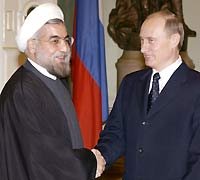 By the summer of 1995, Russia and Iran embarked on what the Russian ambassador there had begun to call a strategic relationship. With the first Chechen war raging and Washington now calling for NATO expansion, Russian nationalists looked to a closer relationship with Iran as a counterbalance. As an article in the newspaper Segodnia in May 1995 noted:
By the summer of 1995, Russia and Iran embarked on what the Russian ambassador there had begun to call a strategic relationship. With the first Chechen war raging and Washington now calling for NATO expansion, Russian nationalists looked to a closer relationship with Iran as a counterbalance. As an article in the newspaper Segodnia in May 1995 noted:"Cooperation with Iran is more than just a question of money and orders for the Russian atomic industry. Today a hostile Tehran could cause a great deal of unpleasantness for Russia in the North Caucasus and in Tajikistan if it were to really set its mind to supporting the Muslim insurgents with weapons, money and volunteers. On the other hand, a friendly Iran could become an important strategic ally in the future.
A Russian analyst, Pavel Felgengauer, writes
NATO's expansion eastward is making Russia look around hurriedly for at least some kind of strategic allies. In this situation, the anti- Western and anti-American regime in Iran would be a natural and very important partner. Armed with Russian weapons, including the latest types of sea mines, torpedoes and anti-ship missiles, Iran could, if necessary, completely halt the passage of tankers through the Strait of Hormuz, thereby dealing a serious blow to the haughty West in a very sensitive spot. If, in such a crisis, Russian fighter planes and anti-aircraft missile complexes were to shield Iran from retaliatory strikes by American carrier-based aircraft and cruise missiles, it would be extremely difficult to 'open' the Gulf without getting into a large-scale and very costly ground war.
Russian-Iranian economic and military relations continued to develop with reports of Russian plans to sell Iran $4 billion of military and other equipment between 1997 and 2007 if Iran met its financial obligations-a provision that may have been inserted because of low oil prices and Iran's weak economy.
Despite some areas of friction, the Russian-Iranian relationship has proved beneficial to both countries. From Russia's standpoint, Iran (despite occasional problems paying its debts) is an excellent arms client and market for nuclear reactors. It has also been an ally against what Moscow has called "U.S. hegemony" as Russian-American relations deteriorated; in helping to bring at least a limited peace in Tajikistan; in confronting the Talibans in Afghanistan; and in containing Azerbaijan. At a time when Russia has not fully recovered economically, with its armed forces (especially its navy) very weak, having Iran as an ally makes excellent diplomatic sense, since an independent Iran helps prevent the United States from fully dominating the Persian Gulf, where Moscow has important interests.
From Iran's point of view, Russia is a secure source of sophisticated arms; a diplomatic ally at a time when the United States has sought to isolate it; an ally in helping to curb Azerbaijan's possible irridentist threat; and an ally in helping stem the terrorist threat and drug flow from Afghanistan.
- Assareh
Some Funny Cartoon....
Iran's Nuclear Program (Part II)

Last time I said that Iran has to pay a price for its nuclear ambitions for two main reasons:
(1) Because it is an ideological and strategic non-ally (I think the word "enemy" is too strong and misleading) of the United States
(2) Because it would set a bad precedent for neighboring countries which could lead to a nuclear arms race in the region.
Now the question before us is this: what is the price Iran is going to pay for its nuclear ambitions? There are various possibilities. Let us examine each separately:
Full-Scale Invasion: this is a very distant possibility. The United States has neither the troops nor the requisite political capital to start a new war, with Iran nontheless. Iran has 3 times the population of Iraq and is 3 times larger too. The Islamic Republic is much more entrenched and institutionalized than Saddam's regime. It has a solid, passionate social base, as well as a dedicated, voluntary Basiji militia. It is hard to imagine how the US could succesfully manage such an undertaking particularly now that it is bogged down in Iraq.
Surgical Strikes: another possibility. Again, hard to imagine for three main reasons: first, these strikes would not be "surgical" in any sense. The United States needs to bomb 50 different facilities which are spread out all over the country. Most of these facilities, in fact, are concentrated near or around large population centers. Surgical strikes in this case would amount to some kind of country-wide bombing which would kill thousands of innocent civilians. Secondly, Iran could retaliate by making Iraq even a bigger mess than it already is; by causing trouble for the US in Afghanistan; by activating the Hezbollah in Lebanon and the Islamic Jihad in Palestine; or even joining forces with some Sunni terrorists for the first time ever. Thirdly, you can bomb the facilities, but you can't bomb the know-how. All experts agree that, even in the best case scenario, such bombing would only delay rather than destroy Iran's nuclear capabilities. Is the US willing to delay Iran's program at the price of further destabilization of the entire region?
Isolation: this is more practical policy option. But how does the US want to isolate Iran? China and Russia would most likely veto any meaningful sanctions at the UN Security Council. No body, not even the Americans, is willing to put up with placing sanctions on Iran's oil exports. The price of oil reached a record-breaking $70 per barrel yesterday. American consumers are already discontent with the rising gas prices, which now exceed $3 per gallon in much of the country. On the other hand, no sanctions would be meaningful if they don't include oil, as the Iranian government generates nearly 80% of its revenues from the sale of oil. Already, in the first 6 months of the current fiscal year, Iran has made some $70B from selling its oil, the most even in its history. Sanctions without oil have no meaning; sanctions with oil, well no body wants them!
Engagement: this is the most practical policy option, but its very costly for both the Bush and the Ahmadinejad administrations. The Bush Administration prides itself on its harsh dealing with terrorists and rogue regimes. It has directed all its effort towards undermining the Islamic Republic and trying to instigate regime change in Iran. Now, after all these years, to come around and talk to Iran? The situation is not much different inside Iran. Though Iran is the only country in the Middle East in which the overwhleming majority of the population is pro-American, the Islamic Republic's base of support remains staunchly anti-Israeli and anti-American. Is the Islamic Republic willing to suppress dissent within its ideological followers in order to negotiate with the United States? All indications so far say "yes." More to come on this later.
- Assareh
Monday, April 17, 2006
Persian Lou Reed!
 Listen to Kiosk, an album put out by Adameh Mamooli (Ordinary Man). The album was recorded, mixed and mastered in various home-studios around the world.
Listen to Kiosk, an album put out by Adameh Mamooli (Ordinary Man). The album was recorded, mixed and mastered in various home-studios around the world. To me this sounds a lot like Lou Reed's early stuff. It's very blueish/rockish. Let me know what you think.
- Assareh
Thursday, April 13, 2006
Just Send Him Back
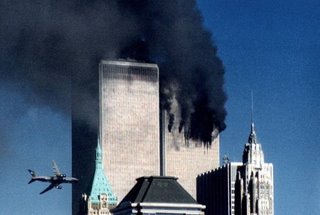 What would you do to a man who proudly accepts a mission from Osama Bin Laden, promises to do everything to destroy America and believes that the 9/11 death toll was too low? Zacarias Moussaoui ,a well know terrorist who has belligerently reaffirmed all the accusations against him, sat in a U.S court yesterday for the second time before the families of 9/11 victims. Zacarias Moussaoui said he would do everything “to the best of his ability” to bring down America, a nation that has afforded a murderer with a fair and public trial. Moussaoui and those who think and act like Moussaoui don’t deserve such treatment. Moussaoui is accused of the following:
What would you do to a man who proudly accepts a mission from Osama Bin Laden, promises to do everything to destroy America and believes that the 9/11 death toll was too low? Zacarias Moussaoui ,a well know terrorist who has belligerently reaffirmed all the accusations against him, sat in a U.S court yesterday for the second time before the families of 9/11 victims. Zacarias Moussaoui said he would do everything “to the best of his ability” to bring down America, a nation that has afforded a murderer with a fair and public trial. Moussaoui and those who think and act like Moussaoui don’t deserve such treatment. Moussaoui is accused of the following:Conspiracy to Commit Acts of Terrorism
Transcending National Boundaries
(18 U.S.C. §§ 2332b(a)(2) & (c))
(Count One)
Conspiracy to Commit Aircraft Piracy
(49 U.S.C. §§ 46502(a)(1)(A) and (a)(2)(B))
(Count Two)
Conspiracy to Destroy Aircraft
(18 U.S.C. §§ 32(a)(7) & 34)
(Count Three)
Conspiracy to Use Weapons of Mass Destruction
(18 U.S.C. § 2332a(a))
(Count Four)
Conspiracy to Murder United States Employees
(18 U.S.C. §§ 1114 & 1117)
(Count Five)
Conspiracy to Destroy Property
(18 U.S.C. §§ 844(f), (i), (n))
(Count Six)
Such charges for a foreign combatant usually result in a military trial. Why is he not being trialed in military tribunal? Why hasn’t he been sent back to his country of origin-Morocco- so he can taste a bit of Moroccan justice at home?
-Aramesh
Wednesday, April 12, 2006
US Policies Inadvertantly Aid Iran

Check this out: it was reported on April 8 that the United States has cancelled or delayed the payment of some $200B in foreign aid to the Palestinian autority.
A couple of days ago Iran announced that an official delegation led by the Palestinian Authority's Finance Minister, Dr. Abdol-Razagh, has visited Tehran with a long list of aid requests.
What does this mean? This means that Hamas and the Islamic Republic are gonna get closer to one another even more than before. This has implications for any kind of measure the United States is willing to take against Iran over its nuclear program. It seriously undermines the United States' policy of containing Iran's influence in the region. I wish that the US would pursue a more coherent policy in the Middle East.
- Assareh
Tuesday, April 11, 2006
U.S- Iran Negotiations; Would it Make any Difference?

 Omid Memarian:“Can Iran-US negotiations stop the insurgency in Iraq? If yes, how and if not, why?” Professor Said Mahmoudi LLD, Head of the Department of International Law at Stockholm University, and a very well known scholar on Iran, has answered exclusively to some questions of Berkeley Forum on possible negotiations between Iran and the U.S.
Omid Memarian:“Can Iran-US negotiations stop the insurgency in Iraq? If yes, how and if not, why?” Professor Said Mahmoudi LLD, Head of the Department of International Law at Stockholm University, and a very well known scholar on Iran, has answered exclusively to some questions of Berkeley Forum on possible negotiations between Iran and the U.S.“Can Iran-US negotiation stop the insurgency in Iraq? If yes, how and if not, why?”
In my view Iran and the US have different expectations from this round of negotiations. Even if stopping insurgencies can reasonably be an obvious common objective of both countries, but I doubt if the two countries agree on the causes of insurgencies. If you do not agree on the sources of the problem, you have hardly any possibility to come to an agreement on the solutions. United States is in a desperate situation in Iraq. They are ready to meet anybody, to break a deal on any issue just to get out of this inferno. Iran is a natural option in this situation. But this does not mean that US-expectations are very high. Another issue that should be remembered is that Iran’s possibilities to influence the political developments in Iraq seem to have been exaggerated. Many foreign observers take it for granted that since large portion of Iraqis are shia, and the clergy is very influential in Iraq, Iran may be in an extraordinary position to influence the turn of the events there. That is not necessarily the case. The present insurgency is not only due to the consolidation of power by the shai Iraqis to the disadvantage of sunnis. The insurgency is to a large part because of sunni’s lost of power irrespective which other groups now is taking over the political power. What I am trying to say is that no matter what shia Iraqis and Iran say and want, sunnies have their own reasons to continue resistance and fight against all foreign forces. Even when they attack shias, the ultimate target is foreign, and particularly, American presence in Iraq. Seen in this perspective, I see little hope that negotiations between Iran and the US will lead to categorical changes in the security situation in Iraq.
For these negotiations are of course of another significance. It is probably the most important foreign policy decision the Iranian leaders have taken after the Revolution. A formal and publicly announced negotiation with Iran’s chief enemy of course opens avenues for further talks in other areas of mutual interest. This is politically a sound decision, since having negotiations does not mean that you have normal political relations or you approve each other, but it certainly makes it possible for the parties to frankly and directly bring their positions to the attention of the other party. Due to the attitudes of lack of confidence between Iran and the US, most probably the planned negotiations cannot lead to any immediate tangible results. It will, however, pave the way for further contacts in near future irrespective of how the two countries feel for each other.
Is Iran's nuclear case, a failure for EU foreign policy? Because now it is out of control of EU and everybody knows they have no authority to do anything without the US?
The role of the European Union in Iran’s nuclear case should be assessed in a broader context. The three EU countries – UK, Germany and France – took a lead in this case toward the end of summer 2004. The reason then was that President Bush, almost sure that he would be re-elected and still very confident that his Iraqi project would succeed, had started to use the language of force against Iran. Both Iran and of course the European countries had taken the threats seriously. For EU it was important to prevent at any price the repetition of the case of Iraq where the USA finally decided to disregard the Security Council and to run its own race. The Troika of the EU did not want to lose the initiative to the USA this time. That was why they offered a deal to Iran, which is now known as the Paris agreement of November 2004, to negotiate with Iran on its nuclear program with the purpose of securing a suspension of all enrichment activities in return for a package of economic and political advantages for Iran. For Iran, it was a very welcome move since, as I mentioned, the country, in the aftermath of Iraq occupation, felt the risk of American military operations imminent. Paris agreement gave Iran the time that the country needed to consolidate its position. As the time passed, the situation deteriorated in Iraq, Iran made a new assessment of its negotiating position, and refused the EU proposals as unacceptable. In retrospect, the EU has certainly failed in its efforts in this case. But one can say exactly the same as regards Russia. It is not so much the failure of EU, but the changing position of Iran, which is the reason. Iran’s changed position is partly due to a new administration, with new priorities and goals, and partly due to developments outside Iran.
Iran's Nuclear Program: Part I
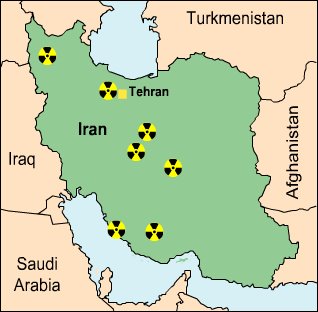 So here's the deal about Iran's nuclear program. The United States is not going to let Iran get nuclear weapons without paying a price. This is quite obvious: first of all, even though Iran and the United States have many common interests in the region, they are nevertheless strategic and geopolitical enemies. Why would the United States let a country with different geopolitical interests than its own get access to the ultimate weapon? Secondly, a nuclear Iran is going to set a bad precedent in the region. Iran also has different geopolitical interests than many of its Arab neighbors, particularly Saudi Arabia; it is involved in a territorial dispute with the United Arab Emirates; its influence in Syria and Lebanon threatens the stability of Jordan and Oman; and so on. Therefore, the geopolitical interests of the United States and much of the Arab world are inimical to the geopolitical interests of Iran. A nuclear Iran would thus provide Saudi Arabia and other countries in the region with a strong incentive to pursue a weapons program of their own. And who would want nukes in Saudi Arabia where millions of little Bin Laden's live?
So here's the deal about Iran's nuclear program. The United States is not going to let Iran get nuclear weapons without paying a price. This is quite obvious: first of all, even though Iran and the United States have many common interests in the region, they are nevertheless strategic and geopolitical enemies. Why would the United States let a country with different geopolitical interests than its own get access to the ultimate weapon? Secondly, a nuclear Iran is going to set a bad precedent in the region. Iran also has different geopolitical interests than many of its Arab neighbors, particularly Saudi Arabia; it is involved in a territorial dispute with the United Arab Emirates; its influence in Syria and Lebanon threatens the stability of Jordan and Oman; and so on. Therefore, the geopolitical interests of the United States and much of the Arab world are inimical to the geopolitical interests of Iran. A nuclear Iran would thus provide Saudi Arabia and other countries in the region with a strong incentive to pursue a weapons program of their own. And who would want nukes in Saudi Arabia where millions of little Bin Laden's live?Therefore, the question is: what price is Iran going to pay for its nuclear program? I will discuss some possibilities in Part II of this article.
Read about the reactions of Iran's Arab neighbors here.
- Assareh
Just Out: Iran has joined the Nuclear Club!

Picture 009Video sent by Bahman1357
This was just announced today: Iran has, for the first time, succesfully enriched uranium to the 3.5% necessary for making fuel (you need 90% enrichment for making a bomb).
- At the White House, Engaging Iran With Words Over Action -New York Times
WASHINGTON, April 11 — One of President Bush's most senior foreign policy advisers spoke with unusual candor last week about the quandary the White House faces as it tries to confront Iran. "The problem is that our policy has been all carrots and no sticks," the adviser told a gathering of academics and outside strategists, according to members of the audience. "And the Iranians know it." It is partly for that reason, other administration officials say, that President Bush and his aides see some benefits in the increasing public discussion about what the White House may do if diplomacy fails to persuade Iran to halt what they suspect is a nuclear weapons program.
- The process of making a bomb: The Nuclear Fuel Cycle
- Iran's Program: Iran's Key Nuclear Sites
-Is Iran next? The calculus of military strike. Christian Science Monitor
- Bush denies Iran nuclear attack plans ABC Online
- US says cannot confirm Iran's enrichment claim Reuters
US Attack on Iran
Monday, April 10, 2006
A Bush Joke
The doorman responds: "God took that one to his room to use it as the fan!!!"
- Assareh
Saturday, April 08, 2006
Panel Discussion on Iran and Israel
 I attended a wonderful discussion on Iran-Israel relations this past Thursday. Here is the audio clip and the speakers’ backgrounds.
I attended a wonderful discussion on Iran-Israel relations this past Thursday. Here is the audio clip and the speakers’ backgrounds. Gen. Shlomo Brom:
Former Israeli Deputy National Security Advisor; Guest Scholar in
Residence, United States Institute of Peace; Senior Research Associate at the Jaffee Centre for Strategic Studies at Tel Aviv University.
Dr. Trita Parsi:
Middle East specialist at Johns Hopkins University, School of Advanced International Studies and author of a forthcoming book on Iranian-Israeli relations published by Yale University Press.
Moderator
Supervisor Ross Mirkarimi:
District 5 Supervisor for the City of San Francisco; Spokesperson for San Franciscans for Public Power; Co-founder of California Green Party.
Co-sponsored by The Center for Middle Eastern Studies, Iranian Student Alliance in America at University of California at Berkeley; Golden Gate University School of Law Jewish Law Students Association; Hastings Association of Muslim Law Students
-Arash Aramesh
Too Many Leaks
 Here is an article by Bill Kristol of the Weekly Standard about the White House leak scandal. Here is my question: what would have been the consequences of such mistakes made my the administration had the Democrats controlled the Capitol Hill?
Here is an article by Bill Kristol of the Weekly Standard about the White House leak scandal. Here is my question: what would have been the consequences of such mistakes made my the administration had the Democrats controlled the Capitol Hill?-Aramesh
Friday, April 07, 2006
INNCOCENT UNTIL PROVEN GUILTY
 Can you believe this? Where else on the face of the earth would a terrorist who has repeatedly confessed to his would be crimes, gets such a fair and just trial? Yes I am talking about ZACARIAS MOUSSAOUI the alleged 20th hijacker. He has been given free reign to attack America, while receiving the best treatment ever afforded to a TERRORIST. The Likes of Moussaoui only understand violence. I would like to pose a mind boggling question to those of you who criticize the American justice system in an unfair fashion? What do you think would have happened to Moussaoui if he were to face trial in Saudi Arabia or Egypt? How many finger nails would he have lost? How many of his family members would have been tortured and coerced to make false testimony? There are many things that are just not right with our American system, but I can proudly say this: it is far better than anywhere else in the world.
Can you believe this? Where else on the face of the earth would a terrorist who has repeatedly confessed to his would be crimes, gets such a fair and just trial? Yes I am talking about ZACARIAS MOUSSAOUI the alleged 20th hijacker. He has been given free reign to attack America, while receiving the best treatment ever afforded to a TERRORIST. The Likes of Moussaoui only understand violence. I would like to pose a mind boggling question to those of you who criticize the American justice system in an unfair fashion? What do you think would have happened to Moussaoui if he were to face trial in Saudi Arabia or Egypt? How many finger nails would he have lost? How many of his family members would have been tortured and coerced to make false testimony? There are many things that are just not right with our American system, but I can proudly say this: it is far better than anywhere else in the world.-Aramesh
Thursday, April 06, 2006
Booming Underground Liquor Business in Iran
 Here are some interesting facts on the booming underground liquor business in Iran:
Here are some interesting facts on the booming underground liquor business in Iran:(1) The government has banned the sale and consumption of alcohol since the Islamic Revolution of 1979.
(2) The small communities of Jews, Christians and Armenians are exempt from this law, a rare instance of religious tolerance from the government. In fact, the Armenian quarters in major cities remain the leading suppliers of homemade wine and liquor.
(3) Before the revolution, about a dozen Iranian factories produced beer, vodka and wine. The Iranian grape is ideal for making spicy wine. This is where the Shiraz Wine comes from: Shiraz is a city in Southern Iran which is well known for its wine and famed poets.
(4) The consumption of alcohol is forbidden in Islam. However, drinking wine is an integral part of the Persian culture. Mei, the word for "wine," and Saaqi, the word for "wine-pourer" have been the central themes of Persian poetry for more than a thousand years. The 11th century Persian poet, Omar Khayyam, writes,
And if the Wine you drink, the Lip you press,
End in the Nothing all Things end in--Yes-
Then fancy while Thou art, Thou art but what
Thou shalt be--Nothing--Thou shalt not be less.
(5) Wine in ancient Persia predates the birth of French wine. Earliest evidence of wine making in Iran: 5,400 B.C; earliest evidence of French wine: 500 B.C.
(6) Black market price for Absolut vodka: $21; Baileys: $43; Heiniken: $2/bottle; drinking alcohol in the Islamic Republic of Iran: priceless.
(7) Many believe that elements within the Islamic Republic government, particularly within the Revolutionary Gaurds [Ahmadinejad's power-base], are behind the widespread smuggling of Alcoholic drinks into Iran. The government's own official figures show that out of 212 active ports in Iran only 61 have the necessary legal operational permits from the central government. So there are about 151 illegal but active ports in Iran that operate without any governmental supervision.
You can read the New York Times's report on the liquor blackmarket in Iran here.
- Assareh
Wednesday, April 05, 2006
OPINION
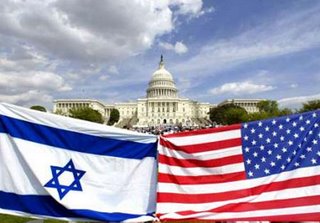
Here are two great articles with two very different viewpoints on American-Israeli relations.
The first article is by John Mearsheimer and Stephen Walt
John Mearsheimer is the Wendell Harrison Professor of Political Science at Chicago, and the author of The Tragedy of Great Power Politics.
Stephen Walt is the Robert and Renee Belfer Professor of International Affairs at the Kennedy School of Government at Harvard. His most recent book is Taming American Power: The Global Response to US Primacy.
The second article is by Nicholas Goldberg, NICHOLAS GOLDBERG is editor of the Op-Ed page for the LA Times.
-Arash Aramesh

1- New format for New York Times website. (I like the last one more...) . The new format is multimedia based.
2- 30 days-Muslims in America -Look at this video, it is amazing, in my opinion....What Islam look like in US? How do you look at Musilms, Islam, and related issues? (Thanks Najla for the link)
3- Azar Nafisi's talk at the NED (video). She is the author of "Reading Lolita in Tehran, bestseller for more than two years talks at NED. A different picture from Iranian society.
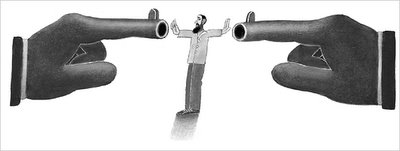 4- Why US Can't Buy Dissent in Iran? Thetyee,Canada.
4- Why US Can't Buy Dissent in Iran? Thetyee,Canada.5- Q&A: IRAN: Bush Administration 'Not Serious' About Dealing With Iran, New York Times...
6-We Do Not Have a Nuclear Weapons Program? NYTimes, javad Zarif
Tuesday, April 04, 2006
Iranians on the West Coast
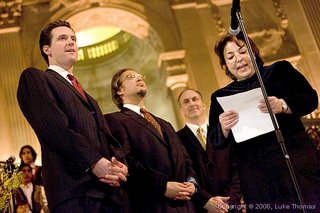 Mayor Gavin Newsom and Supervisor Ross Mirkarimi hosted 1st annual Iranian New Year, Nowrooz, celebration
Mayor Gavin Newsom and Supervisor Ross Mirkarimi hosted 1st annual Iranian New Year, Nowrooz, celebrationHere are some great photos from the Iranian New Year celebration in San Francisco.
-Arash Aramesh
The World Cup is Coming!
 Chinese models wearing bikinis with the World Cup soccer designs, including one with the Islamic Republic's flag. You can see the Allah symbol on the Chinese model's left breast!
Chinese models wearing bikinis with the World Cup soccer designs, including one with the Islamic Republic's flag. You can see the Allah symbol on the Chinese model's left breast!This photo was taken at the China Fashion Week Festival in Beijing on Saturday, April 1, 2006. And No! This is not an April's fools joke! Allah is on China's left breast! (AP Photo/Ng Han Guan)
- Assareh
The End of a Legacy

Tom Delay finally stepped down. Delay will be remembered as one of the most powerful majority leaders in the history of the House of Representatives. He was elected to his seat in the 22nd district of Texas almost 21 years ago, becoming the first Republican Fort Bend County ever elected to the United States Congress.
Delay’s reign as majority leader, in my opinion, was a golden era for Republicans. Under the leadership of Delay, nicknamed "the hammer," the GOP sustained its majority in the House and passed virtually every piece of legislation brought to the floor by prominent Republicans. Delay’s aggressive redistricting in Texas increased the number of Republican representatives in the House, making a red state even redder. Putting all these corruption allegations aside,in my opinion, Delay is a good example of a strong and agressive leader. He is exactly what the Democrats so desperately need. It is going to be a difficult task for John Boehner to fill the shoes of such a leader.
-Arash Aramesh
A New Record for the Islamic Republic of Iran!
 A new record for the Islamic Republic: Iran is the world's 7th largest importer of beauty products and ranks 3rd in per capita usage of such products. Nowadays, many Westerners who travel to Iran - specially the richer parts of Northern Tehran - are amazed by what they see. The "street fashion," as they call it, has spread rapidly among the Iranian youth who comprise nearly 70% of Iran's population. Yes, more than 2/3 of Iran's 70 million population is under the age of 30! During the 1980s, under Ayatollah Khomeini's leadership, the Iranian government encouraged people to be fruitful (!) and multiply in massive numbers. Within that decade, 2 million babies were born each year. Iran's population suddenly doubled, jumping from around 30 million in 1979 to more than 60 million by the early 1990s. Khomeini's ideological plan was to create a 20-million-man army to defend and propogate the Iranian Revolution. In a historic speech, delivered on Nov. 27 of 1979, Khomeini declared, "A country with 20 million youth must have 20 million riflemen or the military with 20 million soldiers; such a country will never be destroyed…”
A new record for the Islamic Republic: Iran is the world's 7th largest importer of beauty products and ranks 3rd in per capita usage of such products. Nowadays, many Westerners who travel to Iran - specially the richer parts of Northern Tehran - are amazed by what they see. The "street fashion," as they call it, has spread rapidly among the Iranian youth who comprise nearly 70% of Iran's population. Yes, more than 2/3 of Iran's 70 million population is under the age of 30! During the 1980s, under Ayatollah Khomeini's leadership, the Iranian government encouraged people to be fruitful (!) and multiply in massive numbers. Within that decade, 2 million babies were born each year. Iran's population suddenly doubled, jumping from around 30 million in 1979 to more than 60 million by the early 1990s. Khomeini's ideological plan was to create a 20-million-man army to defend and propogate the Iranian Revolution. In a historic speech, delivered on Nov. 27 of 1979, Khomeini declared, "A country with 20 million youth must have 20 million riflemen or the military with 20 million soldiers; such a country will never be destroyed…”Now, it seems as if the 20-million-man army Khomeini was calling for has come back to bite the regime in the arse. Instead of foot-soldiering the Islamic Republic's cause, this generation of Iranian youth has become the driving force behind the counter-culture revolution that is sweeiping the country's richer parts today. Images of Iranian women with the black chador are gradully being replaced by images of fashionably-dressed women with lots of makeup, highlights, and piercings.
In fact, such images shock many Iranians who travel back to their country after many years as well as Western journalists who visit Iran for the first time. One such visitor writes,
The same sub-cultures that exist in the west, like the druggies, the snobs,
the intellects, the hippies, the artists, the virgins and the experienced, the
gays are also existent in Iran but the difference is that now you can easily set
them apart on the streets by their dress-code and their encounter. They also
have their distinct cafes in the back streets of Tehran ... you would be amazed
at the kind of fashion that exists in Iran right now... people wear absolutely
what they want... the gay guys are wearing their nail-polish and earrings etc
and the girls are not short of any make-up or bare skin on the street... You
hardly wear any scarf in Iran, you practically see everyones' hair style and it
is the latest fashion that I see here in Amsterdam... [read the full article here]
Many argue the this counter-culture movement in Iran represents a wider struggle against the regime in the form of a passive revolution. Proponents of this idea argue that, since the costs of direct political activism in Iran are very high, opposition against the regime has gradually taken a cultural form; and that by opposing the establishment's preferred cultural norms, Iranian youth are actually using street-fashion as a weapon against the coercive might of the Islamic Republic. Clearly, since there is so many of them, the regime cannot do anything about it.
There are others, however, who argue that this is not an instance of a passive revolution, but of low self-esteem, of a deep psychological crisis that has afflicted Iran in recent years. The counter-culture movement in Iran, they say, is not a force for opposing the the regime, but rather a symptom of Iran's deep psychological crisis brought about by the restrictive social and cultural policies of the Islamic Republic.
Which argument is closer to truth, I don't know yet. All I know and hear is that girls in Iran - specially the rich parts of Northern Tehran - are getting hotter and hotter everyday, which makes me want to go back soon and... pay a visit to my family - yeah right!
View picture of the Iranian youth vacationing here!
More pictures of parties and girls here!
- Assareh
Norouz
This clip is on Iranian New Year eve at I-house in Berkeley, where Iranian meals were served for all international students....
NPR Analysis: Thomas Friedman

Listen to Thomas Friedman’s analysis online on NPR on Hamas, the Israeli elections, the Iraqi mess, Iran, energy crisis, and US's foreign policy. I enjoyed this interview a lot… “The second most frightening thing for Iran, he says, would be a U.S. success in Iraq.”
Sunday, April 02, 2006
Upscale Club in Northern Tehran... Wooohoooo!
 Check out pictures of the Farmanieh Club, an upscale club in Northern Tehran. Its so gorgeous! This is how, as we say in Farsi, the az-maa-behtaroon ["the-better-than-us"] live their lives. There's such a disparity of wealth in Iran: about 40% of Iran's population lives under the poverty line. This is where the current President Ahmadinejad gathers much of his su
Check out pictures of the Farmanieh Club, an upscale club in Northern Tehran. Its so gorgeous! This is how, as we say in Farsi, the az-maa-behtaroon ["the-better-than-us"] live their lives. There's such a disparity of wealth in Iran: about 40% of Iran's population lives under the poverty line. This is where the current President Ahmadinejad gathers much of his su pport base from. His best-known campaing slogan wasn't about Iran's right to nuclear technology or wiping Israel of the map, but about spreading the oil wealth. In fact, Ahmadinejad's first budget package, which is currently going through the Majlis (Parliament), is actually the largest in Iran's history. Ahmadinejad is definitely riding the income-inequality wave in Iran. One reason for his popularity was his simple lifestyle, as depicted in this picture. He still lives in this simple house in Narmak, a typical low-income neighborhood in Tehran. During his campaign, Ahmadinejad bashed the Islamic Republic's establishment for their corruption and inattentiveness to the needs of the common man. In fact, his supporters distributed millions of CD's and DVD's about the corruption of Ahamdinejad's main rival, former president
pport base from. His best-known campaing slogan wasn't about Iran's right to nuclear technology or wiping Israel of the map, but about spreading the oil wealth. In fact, Ahmadinejad's first budget package, which is currently going through the Majlis (Parliament), is actually the largest in Iran's history. Ahmadinejad is definitely riding the income-inequality wave in Iran. One reason for his popularity was his simple lifestyle, as depicted in this picture. He still lives in this simple house in Narmak, a typical low-income neighborhood in Tehran. During his campaign, Ahmadinejad bashed the Islamic Republic's establishment for their corruption and inattentiveness to the needs of the common man. In fact, his supporters distributed millions of CD's and DVD's about the corruption of Ahamdinejad's main rival, former president - View Ahmadinejad's Official Website Here!
- View Farmanieh Club's Pictures Here!
- Read Ahmadinejad's Interview with USA Today Here!
- Assareh
New Year's Celebrations in Tehran
 Here's a very interesting slideshow of the Nowrooz (new year's) celebrations in Iran. The Persian new year starts on the first day of spring, and is actually one of the oldest and most accurate solar calendars. The first 6 Persian months have 31 days and the last 6 have 30; so much easier to learn than the knuckle song!! I never understood why we add the extra day to February, in the Persian calendar you add the extra day to Esfand, the last month. Seems much more common-sensical no?
Here's a very interesting slideshow of the Nowrooz (new year's) celebrations in Iran. The Persian new year starts on the first day of spring, and is actually one of the oldest and most accurate solar calendars. The first 6 Persian months have 31 days and the last 6 have 30; so much easier to learn than the knuckle song!! I never understood why we add the extra day to February, in the Persian calendar you add the extra day to Esfand, the last month. Seems much more common-sensical no?Link to the Slideshow. Enjoy!
- Assareh
Saturday, April 01, 2006
UNSC; What is the Next Step?
 Here is the press conference video of Permanent Representative of Iran, H.E. Mr. M. Javad Zarif, to the United Nations. Since coming to office of Ahmadinejad the conservatives in Tehran have tried to replace Mr. Zarif many times. But, as they couldn’t find anyone to replace him, he has remained in charge. He explains the current situation of Iran’s nuclear dossier, hopelessly alluding to the unbearable extent of US pressure over Iran. The Q&A is also interesting! The big question now is: what is the next step?
Here is the press conference video of Permanent Representative of Iran, H.E. Mr. M. Javad Zarif, to the United Nations. Since coming to office of Ahmadinejad the conservatives in Tehran have tried to replace Mr. Zarif many times. But, as they couldn’t find anyone to replace him, he has remained in charge. He explains the current situation of Iran’s nuclear dossier, hopelessly alluding to the unbearable extent of US pressure over Iran. The Q&A is also interesting! The big question now is: what is the next step? 
- UN: LiveWebcasts and Pre-Recorded Programming (24 Hours)- Archive
-Omid
The "Stockholm Syndrome"
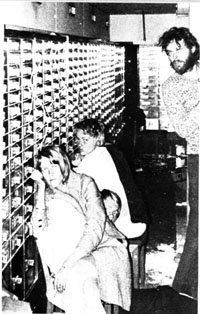 The freed US journalist, Jill Caroll, said today that the statements made by her defending her Iraqi captors were 'manipulated.' Look here:
The freed US journalist, Jill Caroll, said today that the statements made by her defending her Iraqi captors were 'manipulated.' Look here:BBC: Freed US Journalist 'Manipulated'
In psychology, this is called the Stockholm Syndrome. The Stockholm Syndrome describes the behavior of kidnap victims who, over time, become sympathetic to their captors. The name dervies from a 1973 hostage incident in Stockholm, Sweden. In Augues of 1973, three women and one man were taken hostage during a bank robbery. Held captive in the bank vault for six days, the four hostages were both threatened and treated with kindness by the two men that held them hostage. Surprisingly, the hostages resisted rescue efforts by the authorities. After they were rescued, they publicly defended their hostage takers, even raising money for the legal defense of the two men. Two of the women held hostage eventually became engaged to their captors. After a number of similar incidents around the world during which hostages bonded with their captors, psychologists discovered that the Stockholm incident was not a lone occurrence. The emotional bonding between hostage and captor was such a common phenomenon among hostages, prisoners of war, victims of physical and emotional abuse, and cult members that scientists named the occurrence the "Stockholm Syndrome," after the 1973 incident.
What causes the Stockholm Syndrome? Captives begin to identify with their captors initially as a defensive mechanism, out of fear of violence. Small acts of kindness by the captor are magnified, since finding perspective in a hostage situation is by definition impossible. Rescue attempts are also seen as a threat, since it's likely the captive would be injured during such attempts. It's important to note that these symptoms occur under tremendous emotional and often physical duress.
The picture above is of the 2 of the hostages, along with their captor, Calrk Oloffson. You can read more about the bank robbery that led to the Stockholm Syndrome here.
- Assareh
Iran's Nuclear Programme
 Here is a series of good articles on the history and current state of Iran's nuclear programme:
Here is a series of good articles on the history and current state of Iran's nuclear programme:
- Part I. The History
- Part II. Are Nuclear Reactors Necessary?
- Part III. The Emerging Crisis
The author of these articles is Mohammad Sahimi, professor and Chairman of Chemical & Petroleum Engineering at the University of Southern California (USC). Since 1986, he has been a member of the Union of Concerned Scientists, an organization devoted to preventing the spread of weapons of mass destruction.
Sahimi has published more than 210 papers in peer-reviewed journals, written four books, and authored several invited reviews and book chapters. He is also the recipient of a Humboldt Research Fellowship Award and the Khwarizmi International Award for Distinguished Scientific Achievements, sponsored by UNESCO.
- Assareh

